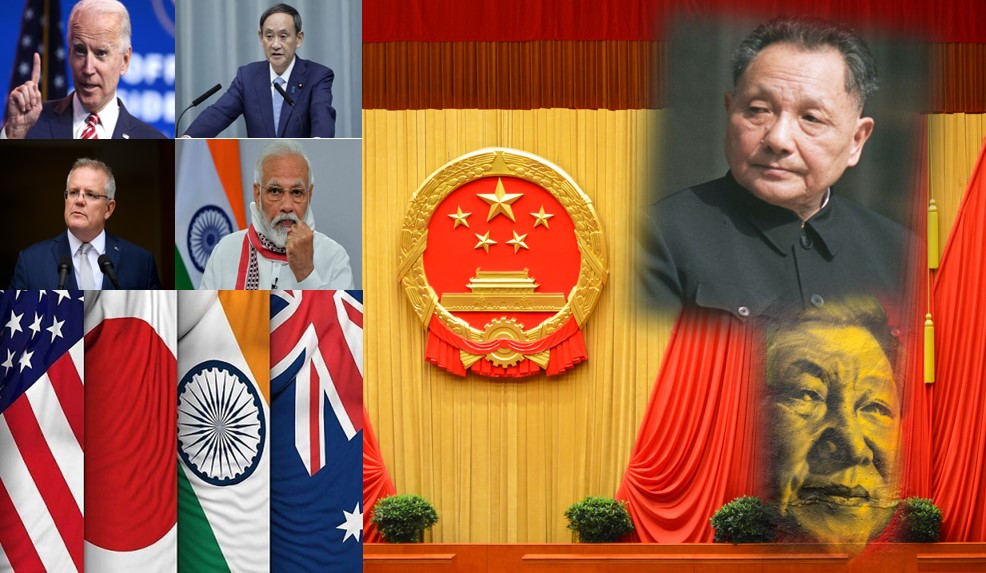
Is Quad Fulfilling Deng Xiaoping’s Vision?
Tue, 08 Jun 2021 | Reading Time: 7 minutes

Is Quad Fulfilling Deng Xiaoping’s Vision?
On April 10, 1974, Deng Xiaoping, the then Chairman of the Delegation of the People’s Republic of China (PRC) at the Special Session of the UN General Assembly in New York, said, “China is not a superpower, nor will she ever seek to be one…..If one day China should change her colour and turn into a superpower, if she too should play the tyrant in the world, and everywhere subject others to her bullying, aggression and exploitation, the people of the world should identify her as social-imperialism, expose it and work together with the Chinese people to overthrow it.” [1] (emphasis mine)
Has the situation described more than forty-seven years ago, by Deng Xiaoping, who later became China’s paramount leader after Mao, arrived? Has China truly started behaving like a superpower of those days, especially of the ‘social-imperialism’ type (Deng’s term for the former Soviet Union)? Is it playing ‘tyrant in the world’, bullying others and being aggressive and exploitative?
As a matter of interest, at that time China published widely this speech internally and to its foreign audience seeking to assure the world that it’s anticipated rise in the future would be peaceful. Referring to worries in some parts of the globe about China’s rise, about forty years later, Foreign Minister Wang Yi, speaking from the same podium at the UN on 27 September 2013, noted that in an unusual year for China when it put forward the concept of “great renewal” of the nation, China would stay firmly on the path of peaceful development. Wang Yi embellished this commitment with references to Deng Xiaoping’s 1974 speech and the patriarch’s promise that the country would never seek hegemony in the world. He said, “Today his statement remains our unchanging commitment and conviction.” [2]
However, the recent outburst of the Chinese Ambassador to Bangladesh, Li Jinming speaking at a virtual event of the Diplomatic Correspondents Association, Bangladesh (DCAB), who said expressly that Bangladesh should not join the ‘Quad’ initiative and that Dhaka’s relations with Beijing will “substantially get damaged” if it does so, has all the elements of a superior power lecturing and attempting to coerce a sovereign state to adopt a position in line with China’s own strategic interests. While such a ‘warning’ or ‘advice’ (depending on which side of the fence you are on) is not uncommon during bilateral and confidential diplomatic parleys, it’s extremely rare for such public finger pointing at a country which has been generally friendly and open, and not hostile to China.
There are two elements to the issue. It confirms, China’s growing fear that the Quad is evolving as a major force, which threatens its untrammeled strategic, economic and military goals in this region and elsewhere. Though Bangladesh has not been invited to join the Quad, nor has it indicated any desire to cosy up to this dialogue mechanism, Ambassador Li, in tune with China’s recent wolf warrior diplomacy image, decided that a public warning would not only stop the country from even contemplating such a move, if invited, but would also serve as warning to other friends in the region and elsewhere to desist from any such thoughts. That it is was not an off the cuff remark, “a failing of English language” taken “out of context” as reportedly explained by Ambassador Li to Bangladesh Foreign Secretary Masud Bin Momen subsequently, [3] , is amply clear from the fact that in April 2021 during his visit to Bangladesh, Chinese Defence Minister Wei Fenghe at a meeting with Bangladesh President Abdul Hamid told the latter that the two countries should make joint efforts against powers from outside the region trying to establish a “military alliance” in South Asia [4]. Perhaps, Bangladesh did not give much credence to Wei’s advice or follow up on it and hence, Li’s ‘warning’.
The second issue is whether the Quad or the idea behind it is the predicted backlash against China’s hegemonistic behavior referred to by Deng in 1974? Does this grouping and the extensive support its ‘core vision of a free and open Indo-Pacific’, continues to receive from other parts of the globe (Germany, France, Netherlands, UK, EU, etc) and the beginning of dialogue partnerships such as with New Zealand, South Korea and Vietnam in May 2020, look like the gathering storm to “…identify her as social-imperialism, expose it, oppose it and work together with the Chinese people to overthrow it.”? [1]
China seems to regard the Quad as a military alliance opposed to its ‘peaceful rise’. Starting from its first dialogue initiated by President Shinzo Abe of Japan in 2007, China has viewed the Quad as an anti-China front and lodged diplomatic protests with all the countries involved – Australia, Japan, India and the US. Asked about the meeting of Quad Foreign Ministers in Tokyo on 29 September 2020, the Chinese Ministry of Foreign Affairs (MFA) spokesman advocated against “forming exclusive cliques”. After the First Quad Leaders’ Summit hosted by President Joe Biden of the US on 12 March 2021, the MFA spokesman said that the grouping should not undermine the interests of any third party or form “cliques”. State controlled media in China dismissed it as an attempt to copy the NATO model. Reacting to the reported statement of US NSA Jake Sullivan that Quad leaders at the Summit had discussed “challenges” posed by China and they had no illusions about it, spokesman of the Chinese Ministry of Defence on 25 March 2021 asked Washington to refrain from making “troubles out of nothing” and do more to contribute to regional peace and stability. The spokesman said that China is firmly opposed to the Quad alliance, and that this “four side mechanism” is promoted by the US as it adheres to Cold War mentality. He elaborated that the Quad mechanism uses so-called “China challenge” as an excuse to “form cliques” and openly provoke relations between regional countries.
China’s increasingly strident reaction to the Quad and its activities, clearly indicates that in recent months, particularly after the Leader’s Summit in March this year, it sees this dialogue mechanism as a serious challenge to its goals and activities in the region. This is surprising given the fact that other than the US, the other three Quad members have never alluded to the China challenge. External Affairs Minister of India, Dr. S. Jaishankar, at the October 20 Quad FMs meeting in Japan, said that “Our objective remains advancing the security and economic interests of all countries having legitimate and vital interests in the region.” [5] Presumably, the reference to ‘all countries’ includes China, provided it subscribes to the shared vision of a free, open rules-based order, rooted in international law, freedom of navigation and overflight, peaceful resolution of disputes, democratic values and territorial integrity. [6]
However, it is clear from China’s activities in the East and South China Seas and along the India-China boundary region that instead of peaceful resolution of claims and disputes, it is willing to take unilateral action to enforce it claims on maritime and land-based territories. It’s curbs on unhindered air and sea passage in and around its claimed maritime territories, is not rooted in international law concerning freedom of navigation and overflight.
It is thus clear that China sees the Quad and the growing influence of the concept of Indo-Pacific as a threat to its hegemonistic activities in the region. Though rooted as an inclusive concept on agreed rules of the game in international relations, the Quad is viewed as a push back against China’s not so peaceful or harmonious rise, which is causing difficulties not only to its neighbours but also to uninterrupted movement of persons and trade through international waters and air space.
Though not declared as an anti-China coalition or front, China and some of its friends, including Russia, perceive the Quad and the concept of Indo-Pacific to be so. Given the existence of anger and disappointment about China’s postures outside its borders, not only among the members of the Quad but also in the wider international community, it is not surprising that the lay observer also views this movement as one against China. After the Quad FM’s meeting last year, even US diplomats are reported to have claimed that “it is China and its actions in the region that made the Quad actually matter and function this time around.” [7]
Let us for a moment assume the above hypotheses to be true. Is then the Quad the reaction predicted by Deng Xiaoping in 1974? Is that why China has so stridently opposed the movement and the concept on which it is based?
If one analyzes the reaction by China to the Quad this year, one would come to the conclusion that the questions raised in the previous paragraph can be answered in the affirmative. While the opposition expressed by China to the Leaders’ Summit and at the reported statement of the United States NSA were anticipated, the public posturing in Bangladesh reveals the extent of anxiety in Beijing about the direction the Quad is taking and its consequences for China if this momentum is maintained. China’s Deng Xiaoping moment seems to be near at hand.
Whether the Quad is the primary reaction to China’s assertive diplomacy and if so, will it have a sobering effect on China’s increasingly assertive diplomacy, is open to debate. What is real is the fact that China is a strong and fast growing global power whose imprint on the international political, economic and military order is second only to that of the United States. Accordingly, whether she remains assertive or readjusts to a more benign form, as advocated by Deng, countries big and small will have to learn how to live and work with this potential superpower.
Keeping in mind its largest neighbour to the north, India is also adjusting its “geopolitical calculus in a world that is being shaped by the dominant powers – China and the United States”. [8] In this editorial, The Indian Express newspaper of 24 May 2021, with reference to the Indian External Affairs Minister’s remarks at a recent event, concludes that India is not going to abandon the difficult dialogue with China nor is it panicking into a military alliance with America.
For India, a benign, peaceful, and rising China, sensitive to the Indian peoples’ aspirations and core concerns would be the ideal situation, so that there is enough room in the region for both the Asian giants to grow and prosper. India will continue to nourish its closer strategic relations with the United States and the developed countries of the west, de-hyphenating its beneficial relations with China, Russia and other power centres. The Quadrilateral framework (Quad), a dialogue mechanism on regional and global issues of common interest and a shared vision of a free, open, and inclusive Indo-Pacific will continue to be an important plank in India’s diplomatic armour. It is earnestly hoped that at some point in future, as the other regional heavyweight, China too will join in this dialogue.
References
- https://www.marxists.org/reference/archive/deng-xiaoping/1974/04/10.htm
- https://gadebate.un.org/en/68/china
- Dhaka Tribune 12/05/2021 https://www.dhakatribune.com/bangladesh/foreign-affairs/2021/05/12/chinese-ambassador-meets-foreign-secy-explains-remarks
- SCMP 13 May 2021 https://www.scmp.com/week-asia/politics/article/3133383/why-was-bangladesh-warned-china-against-joining-quad
- https://mea.gov.in/Speeches-Statements.htm?dtl/33097/Opening_remarks_by_EAM_at_2nd_Quad_Ministerial_Meeting_in_Tokyo_Japan
- Quad Leaders’ Joint Statement; https:// www.mea.gov.in/bilateral-documents.htm.dtl/33620/Quad+Leaders+Joint+Statement+The+Spirit+of+the+Quad
- China’s Two-Pronged Response to the Quad by Shannon Tiezzi, The Diplomat, October 07, 2020, https://thediplomat.com/202/10/chinas-two-pronged-response-to-the-quad
- https://indianexpress.com/article/opinion/editorials/without-hyphen-external-affairs-minister-jaishankar-beijing-washington-delhi-7327198/
Author

Debnath Shaw, former Ambassador of India to Azerbaijan and High Commissioner to Tanzania, is a career diplomat and has served in various Indian diplomatic missions in Hong Kong, Bonn and Dhaka. He had two tenures in Indian Embassy in Beijing, China during his career as an IFS officer.
Disclaimer
The opinions expressed in this article are the author’s own and do not reflect the views of Chanakya Forum. All information provided in this article including timeliness, completeness, accuracy, suitability or validity of information referenced therein, is the sole responsibility of the author. www.chanakyaforum.com does not assume any responsibility for the same.
Chanakya Forum is now on . Click here to join our channel (@ChanakyaForum) and stay updated with the latest headlines and articles.
Important
We work round the clock to bring you the finest articles and updates from around the world. There is a team that works tirelessly to ensure that you have a seamless reading experience. But all this costs money. Please support us so that we keep doing what we do best. Happy Reading
Support Us




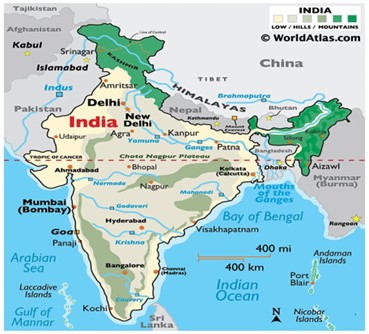






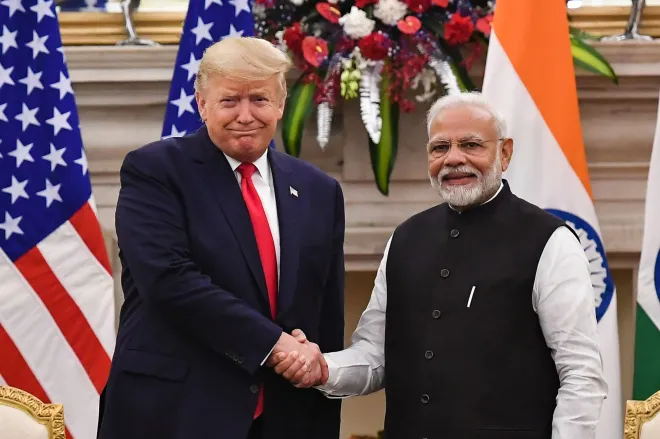
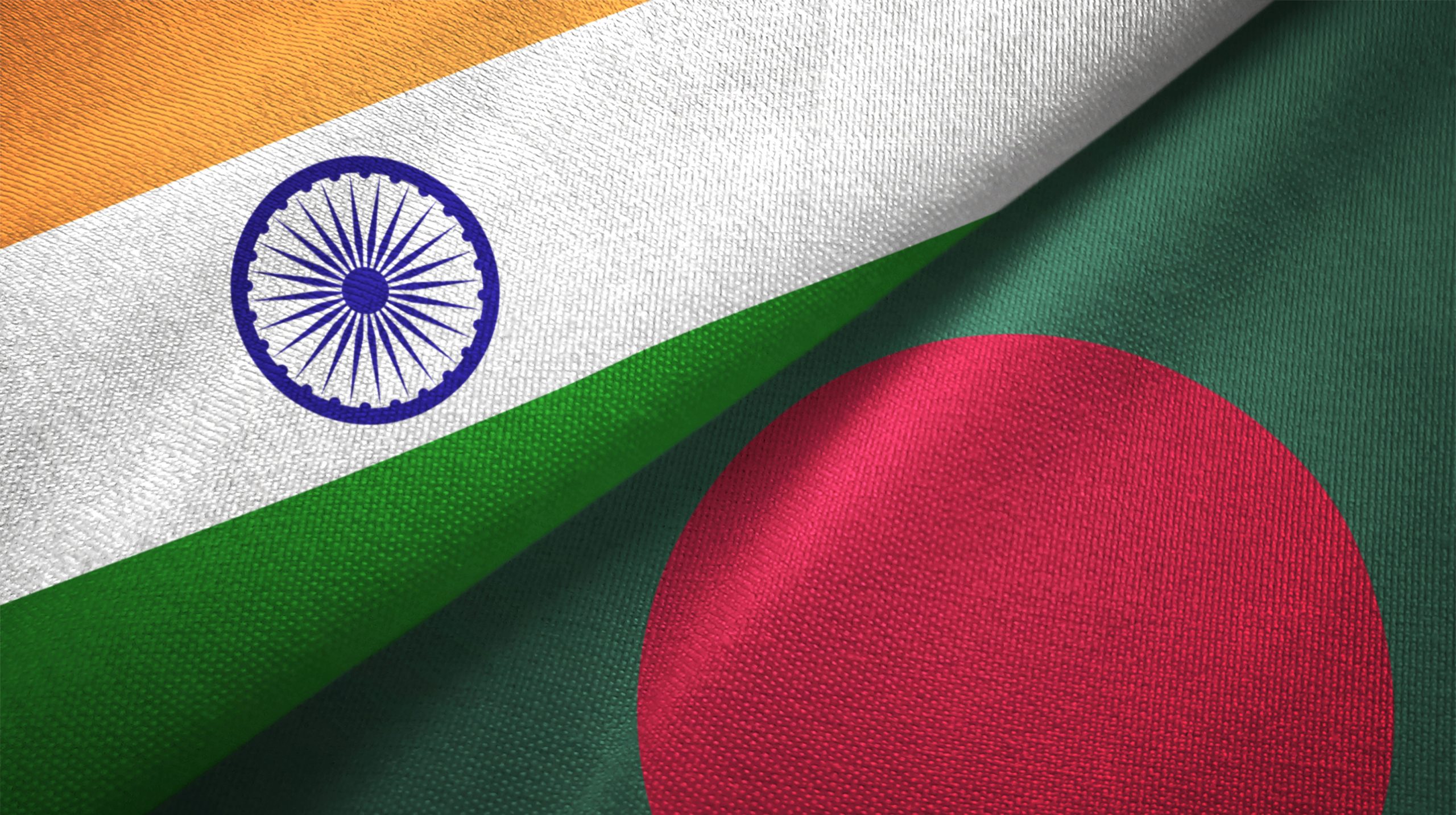
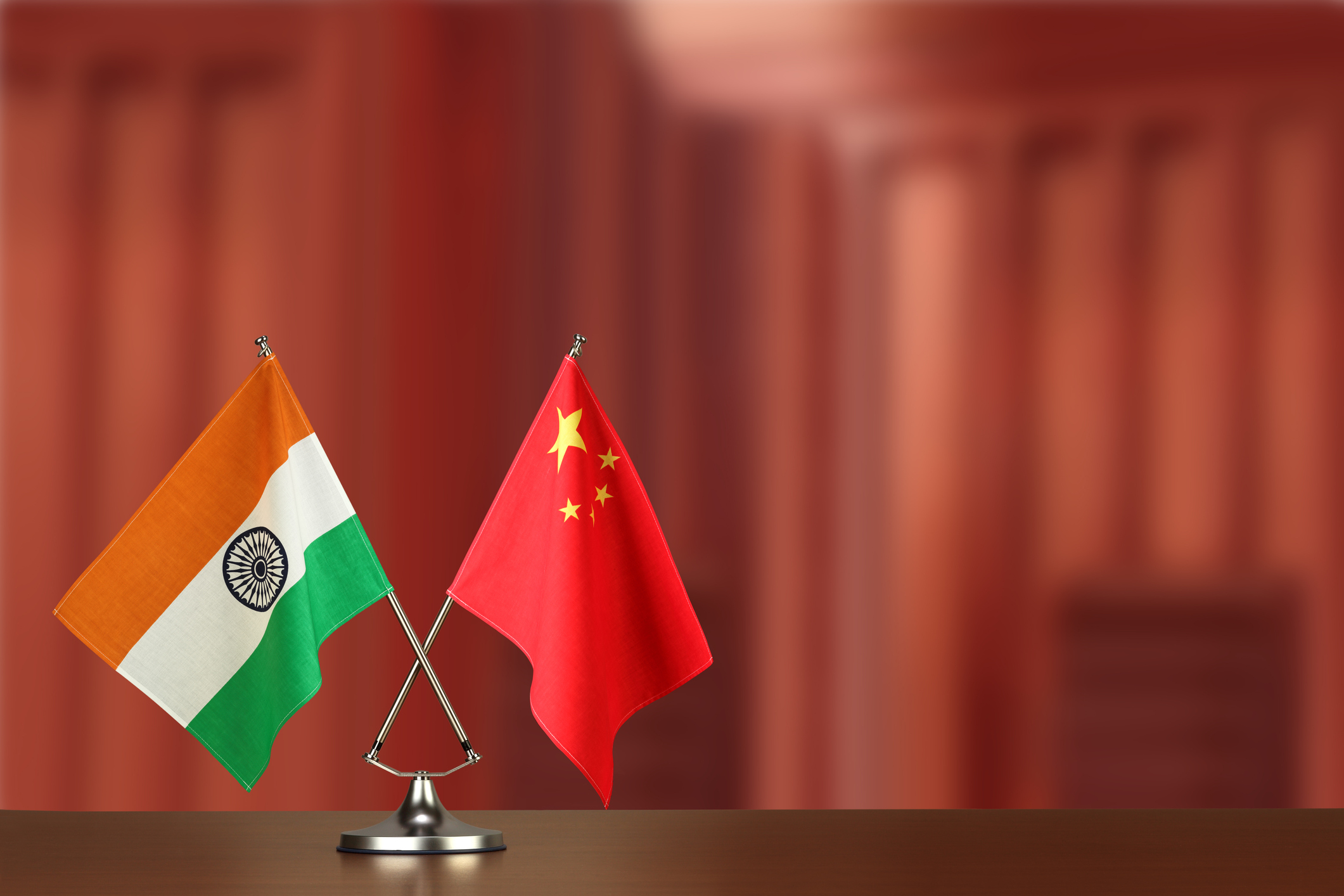






POST COMMENTS (10)
PRIYANSHU
Pesudonym
Nishant
Mukesh Naik
Rintu Bhowmik
Gyanchand luwang
jagresh vishwakarma
Poonam Dave
mohit jain